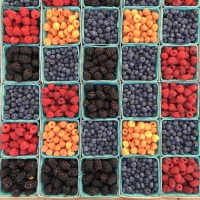In today’s fast-paced world, it is vital to make conscious choices about the food we consume. With increasing awareness about the benefits of organic produce, more and more individuals are embracing the wholesome goodness of farm-fresh, organic fruits and vegetables. In this article, we will explore the reasons why organic produce is gaining popularity, the benefits it offers, and how you can incorporate it into your daily diet.
The Rise of Organic Produce
Understanding Organic Farming
Organic farming is a holistic approach to agriculture that focuses on promoting ecological balance and conserving biodiversity. Unlike conventional farming methods that rely on synthetic fertilizers, pesticides, and genetically modified organisms (GMOs), organic farming emphasizes the use of natural techniques and substances. This means that organic farmers prioritize soil health, natural pest control, and the use of organic fertilizers. Consequently, organic produce is grown without the use of synthetic chemicals or genetic engineering.
Increasing Popularity of Organic Produce
Over the past decade, there has been a significant rise in the demand for organic produce. This can be attributed to several factors, including: bold and beautiful steffy leaving
-
Health Concerns: Many consumers are becoming increasingly health-conscious and are seeking healthier alternatives to conventionally grown food. Organic produce is considered to be more nutritious as it is often grown in nutrient-rich soil without the use of synthetic chemicals. Additionally, organic farmers are prohibited from using antibiotics or growth hormones in livestock, making organic meat and dairy products a healthier choice.
-
Environmental Impact: The environmental impact of conventional agriculture, including soil degradation, water pollution, and greenhouse gas emissions, has raised concerns among consumers. Organic farming practices, on the other hand, prioritize environmental sustainability. By avoiding the use of synthetic chemicals, organic farmers help preserve soil fertility, protect water sources, and reduce carbon emissions. This resonates with individuals who are mindful of their ecological footprint.
-
Taste and Quality: Organic produce is often praised for its superior taste and quality. The natural growth process allows organic fruits and vegetables to develop their flavors fully. Additionally, organic farming practices prioritize harvesting crops at their peak ripeness, ensuring that consumers get to enjoy produce that is at its freshest and most flavorful.
The Benefits of Organic Produce
Organic produce offers a plethora of benefits for both our health and the environment. Here are some key advantages:
1. Improved Nutritional Value
Organic fruits and vegetables have been found to have higher levels of certain nutrients compared to conventionally grown produce. Studies have shown that organic crops contain higher levels of certain vitamins, minerals, and antioxidants. For example, organic spinach has been found to have higher levels of vitamin C and iron compared to conventionally grown spinach.
2. Reduced Exposure to Chemicals
One of the main reasons consumers choose organic produce is to minimize their exposure to harmful chemicals. Conventionally grown crops are often treated with synthetic pesticides and herbicides, which can leave residues that may be harmful to human health. By opting for organic produce, individuals can reduce their exposure to these potentially harmful substances.
3. Environmental Sustainability
Organic farming practices prioritize the preservation of natural resources and the reduction of environmental impact. By avoiding the use of synthetic fertilizers and pesticides, organic farmers help protect soil health and minimize water pollution. Additionally, organic farming promotes biodiversity by providing natural habitats for beneficial insects and animals.
4. Support for Local Farms
Choosing organic produce often means supporting local farmers who follow sustainable agricultural practices. By purchasing organic products, consumers contribute to the growth of the local economy and help small-scale farmers thrive. This fosters a stronger sense of community and ensures that farming practices that prioritize sustainability are encouraged.
Incorporating Organic Produce into Your Diet
Now that we understand the benefits of organic produce, let’s explore how we can incorporate it into our daily diet:
1. Shop at Local Farmers’ Markets
Visiting local farmers’ markets is a great way to access a wide selection of organic produce. These markets allow you to directly connect with farmers and learn more about their growing practices. By supporting local farmers, you are also reducing the environmental impact associated with transporting food over long distances.
2. Join a Community-Supported Agriculture (CSA) Program
Joining a CSA program is an excellent way to ensure a steady supply of organic produce throughout the growing season. CSA members typically pay a fee upfront and receive weekly or monthly shipments of fresh, locally grown produce. This not only supports local farms but also allows you to enjoy a rich variety of organic fruits and vegetables.
3. Grow Your Own Organic Garden
If you have space in your backyard or access to a community garden, consider starting your own organic garden. This allows you to have complete control over the growing process and ensures that you are consuming the freshest, pesticide-free produce. Additionally, gardening can be a rewarding and therapeutic experience.
4. Make Simple Swaps in Your Grocery Shopping
When grocery shopping, make a conscious effort to choose organic options whenever possible. Start by swapping out a few items such as organic apples, tomatoes, or leafy greens. Over time, you can expand your organic shopping list and gradually transition to a diet that predominantly consists of organic produce.
Comparison Chart: Organic vs. Conventional Produce
To help you understand the differences between organic and conventional produce, let’s compare them side by side using the following chart:
| Aspect | Organic Produce | Conventional Produce |
|---|---|---|
| Production | Grown without synthetic chemicals | May use synthetic chemicals |
| Nutritional Value | Higher in certain nutrients | May have lower nutrient content |
| Pesticide Residues | Lower levels of pesticide residues | May contain pesticide residues |
| Environmental Impact | Promotes sustainability in farming | Potential for environmental degradation |
| Taste | Often praised for superior taste | Taste may vary based on growing conditions |
| Supporting Local Farms | Supports local, sustainable agriculture | Supporting various farming practices |
Conclusion
Embracing the wholesome goodness of organic produce is an excellent choice for both our health and the environment. Organic farming practices prioritize sustainability, promote better nutrition, and reduce our exposure to harmful chemicals. By incorporating organic produce into our daily diet, we support local farmers and contribute to a healthier and more sustainable food system. So take a step towards a healthier future and savor the farm-fresh flavor of organic produce on your plate.










